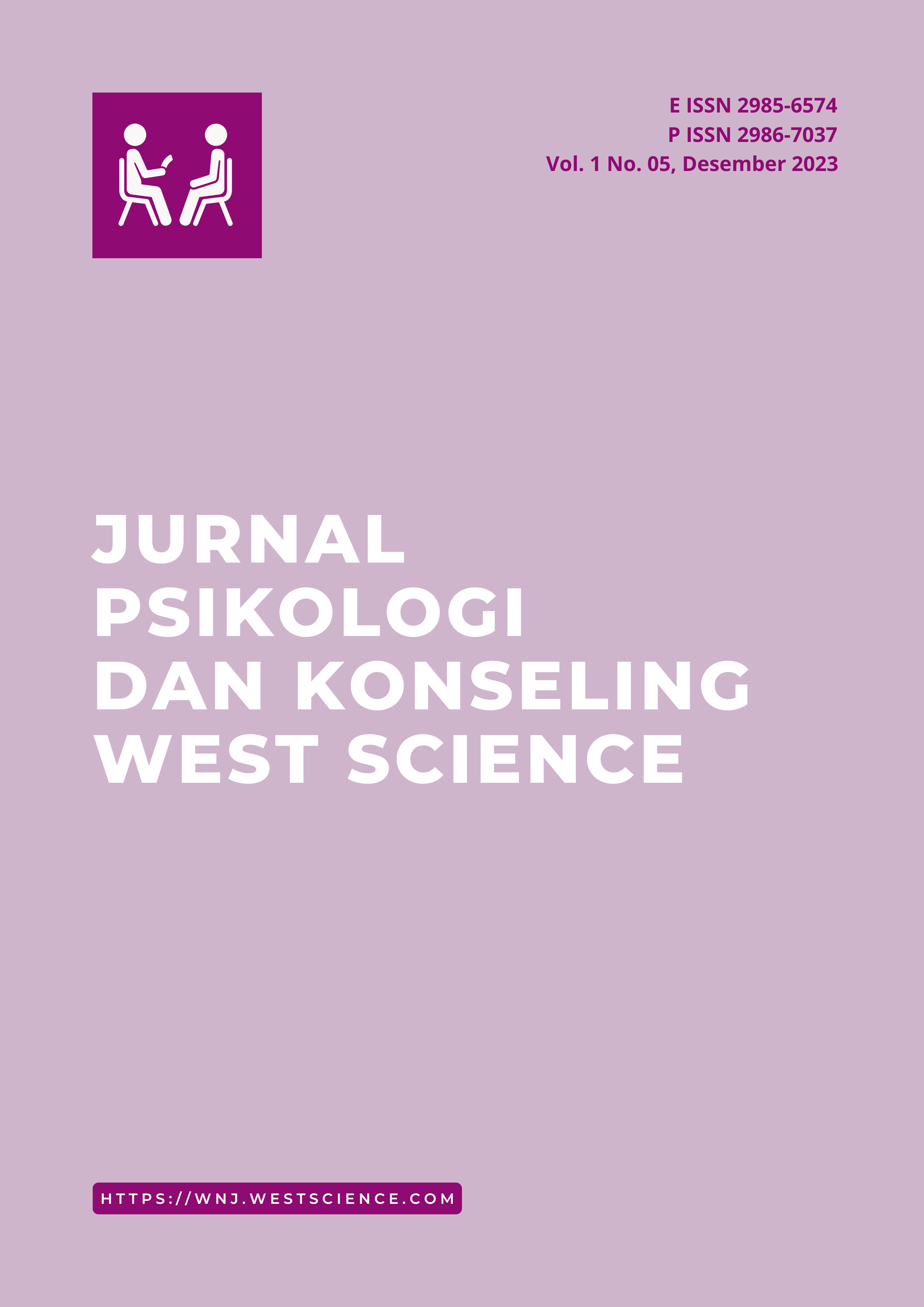Artikel Review: Dampak Kecanduan Bermain Game Terhadap Kesehatan Mental
DOI:
https://doi.org/10.58812/jpkws.v1i05.827Kata Kunci:
Gangguan bermain Game, Permainan Internet, Kesehatan Mental, RemajaAbstrak
Perkembangan teknologi di era 21 ini memunculkan berbagai fitur, aplikasi dan game tercanggih. Hal tersebut mempengaruhi pengguna dari anak-anak, remaja hingga dewasa. Kecanduan menggunakan internet seperti bermain game adalah salah satu hal yang menyita waktu para remaja pada saat ini. Waktu bermain game yang sudah tidak terkontrol berdampak pada interaksi sosial, kualitas tidur dan kesehatan mental penggunanya. Penelitian ini menggunakan metode literature review. Tolak ukur jurnal yang dipilih yaitu jurnal dengan terbitan tahun 2019-2023 terdiri dari jurnal nasional dan internasional. Berdasarkan dari hasil dan pembahasan yang ada didapatkan bahwa terdapat hubungan antara game disorder terhadap kesehatan mental remaja. Kesimpulan yang diperoleh adalah terbukti adanya hubungan diantara hal tersebut. Oleh sebab itu, disarankan kepada orang tua dan para remaja untuk lebih memperhatikan anak dalam bermain game dengan baik agar tidak mempengaruhi kesehatan mental pada remaja.
Referensi
Abd-Alrazaq, A., Al-Jafar, E., Alajlani, M., Toro, C., Alhuwail, D., Ahmed, A., Reagu, S. M., Al-Shorbaji, N., & Househ, M. (2022). The Effectiveness of Serious Games for Alleviating Depression: Systematic Review and Meta-analysis. JMIR Serious Games, 10(1). https://doi.org/10.2196/32331
Boyle, E. A., Connolly, T. M., Hainey, T., & Boyle, J. M. (2012). Engagement in digital entertainment games: A systematic review. Computers in Human Behavior, 28(3), 771–780. https://doi.org/10.1016/j.chb.2011.11.020
David, O. A., Predatu, R., & Cardoș, R. A. I. (2021). Effectiveness of the REThink therapeutic online video game in promoting mental health in children and adolescents. Internet Interventions, 25. https://doi.org/10.1016/j.invent.2021.100391
Dewhirst, A., Laugharne, R., & Shankar, R. (2022). Therapeutic use of serious games in mental health: scoping review. BJPsych Open, 8(2), 1–14. https://doi.org/10.1192/bjo.2022.4
Erik, S., & Syenshie, W. V. (2020). Hubungan Durasi Bermain Game Online Dengan Kesehatan Mental Pada Remaja Pria. Jurnal Ilmiah Kesehatan Jiwa, 2(2), 69–75.
Gonzalez, C. A. F., Villaverde, S. R., Barroso, J. L. G., & Aguado, J. M. (2012). Mobile gaming: Industry challenges and policy implications. Telecommunications Policy, 36(3), 212–221. http://oa.upm.es/15635/
Higuchi, S., Nakayama, H., Matsuzaki, T., Mihara, S., & Kitayuguchi, T. (2021). Application of the eleventh revision of the International Classification of Diseases gaming disorder criteria to treatment-seeking patients: Comparison with the fifth edition of the Diagnostic and Statistical Manual of Mental Disorders Internet gaming dis. Journal of Behavioral Addictions, 10(1), 149–158. https://doi.org/10.1556/2006.2020.00099
Hu, E., Stavropoulos, V., Anderson, A., Scerri, M., & Collard, J. (2019). Internet gaming disorder: Feeling the flow of social games. Addictive Behaviors Reports, 9(June 2018), 100140. https://doi.org/10.1016/j.abrep.2018.10.004
Kelly, R. (2004). Massively multiplayer online role-playing games: The people, the addiction and the playing experience. Mcfarland & Company.Inc.
Kuss, D. J. (2013). Internet gaming addiction: Current perspectives. Psychology Research and Behavior Management, 6, 125–137. https://doi.org/10.2147/PRBM.S39476
Labata-Lezaun, N., González-Rueda, V., Llurda-Almuzara, L., López-de-Celis, C., Rodríguez-Sanz, J., Bosch, J., Vicente-Rodríguez, G., Gorczakowska, D., Araluze-Arizti, P., & Pérez-Bellmunt, A. (2023). Effectiveness of multicomponent training on physical performance in older adults: A systematic review and meta-analysis. Archives of Gerontology and Geriatrics, 104(October 2022), 104838. https://doi.org/10.1016/j.archger.2022.104838
Lin, S., Yu, C., Chen, J., Sheng, J., Hu, Y., & Zhong, L. (2020). The association between parental psychological control, deviant peer affiliation, and internet gaming disorder among chinese adolescents: A two-year longitudinal study. International Journal of Environmental Research and Public Health, 17(21), 1–13. https://doi.org/10.3390/ijerph17218197
LUSIANA, V. (2023). Pengaruh Kecanduan Game Online Terhadap Kesehatan Mental Siswa Smai Nfbs Lembang. HEALTHY : Jurnal Inovasi Riset Ilmu Kesehatan, 2(1), 29–41. https://doi.org/10.51878/healthy.v2i1.2107
Moge, C. E., & Romano, D. M. (2020). Contextualising video game engagement and addiction in mental health: the mediating roles of coping and social support. Heliyon, 6(11), e05340. https://doi.org/10.1016/j.heliyon.2020.e05340
Moreno, M., Riddle, K., Jenkins, M. C., Singh, A. P., Zhao, Q., & Eickhoff, J. (2022). Measuring Problematic Internet Use, Internet Gaming Disorder, and Social Media Addiction in Young Adults: Cross-sectional Survey Study. JMIR Public Health and Surveillance, 8(1). https://doi.org/10.2196/27719
Purwaningsih, E., & Nurmala, I. (2021). The Impact of Online Game Addiction on Adolescent Mental Health: A Systematic Review and Meta-analysis. Open Access Macedonian Journal of Medical Sciences, 9(F), 260–274. https://doi.org/10.3889/oamjms.2021.6234
Seong, W., Hong, J. S., Kim, S., Kim, S. M., & Han, D. H. (2019). Personality and psychological factors of problematic internet gamers seeking hospital treatment. Frontiers in Psychiatry, 10(AUG), 1–8. https://doi.org/10.3389/fpsyt.2019.00583
Shin, D., Choi, A. R., Lee, J., Chung, S. J., Kim, B., Park, M., Jung, M. H., Kim, D. J., & Choi, J. S. (2019). The mediating effects of affect on associations between impulsivity or resilience and internet gaming disorder. Journal of Clinical Medicine, 8(8), 1–11. https://doi.org/10.3390/jcm8081102
Snyder, H. (2019). Literature review as a research methodology: An overview and guidelines. Journal of Business Research, 104(March), 333–339. https://doi.org/10.1016/j.jbusres.2019.07.039
Ünübol, H., Koç, A. Ş., Sayar, G. H., Stavropoulos, V., Kircaburun, K., & Griffiths, M. D. (2021). Measurement, Profiles, Prevalence, and Psychological Risk Factors of Problematic Gaming Among the Turkish Community: A Large-scale National Study. International Journal of Mental Health and Addiction, 19(5), 1662–1682. https://doi.org/10.1007/s11469-020-00254-8
Wong, H. Y., Mo, H. Y., Potenza, M. N., Chan, M. N. M., Lau, W. M., Chui, T. K., Pakpour, A. H., & Lin, C. Y. (2020). Relationships between severity of internet gaming disorder, severity of problematic social media use, sleep quality and psychological distress. International Journal of Environmental Research and Public Health, 17(6), 1–13. https://doi.org/10.3390/ijerph17061879
Yu, Y., Mo, P. K. H., Zhang, J., Li, J., & Lau, J. T. F. (2021). Impulsivity, self-control, interpersonal influences, and maladaptive cognitions as factors of internet gaming disorder among adolescents in China: Cross-sectional mediation study. Journal of Medical Internet Research, 23(10), 1–15. https://doi.org/10.2196/26810
Zabrina, H. K. (2023). Relationship Between Online Game Addiction And Depression Tendencies In Indonesian Adolescents. Indonesian Journal of Health Sciences Research and Development (Ijhsrd), 5(1), 101–105. https://doi.org/10.36566/ijhsrd/vol5.iss1/154
Unduhan
Diterbitkan
Cara Mengutip
Terbitan
Bagian
Lisensi
Hak Cipta (c) 2023 Meri Yulianti Putri, Yuliana Yuliana, Asmar Yulastri, Zulfa Erianti, Widi Aliffa Izzara

Artikel ini berlisensiCreative Commons Attribution-ShareAlike 4.0 International License.



















 Instagram
Instagram 